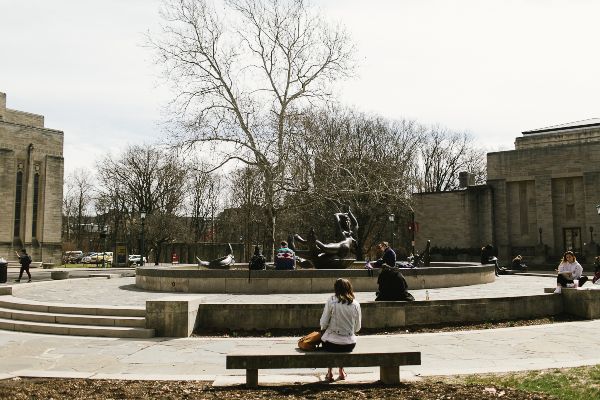What if our college campuses were designed for us to have rich, deep, enduring friendships? And what if our Catholic faith had the power to re-enliven our campuses? I’d like to propose that both of those statements are true — the college campus is, naturally speaking, a friendship-making institution; and even if the campus is dead or dying, our Catholic faith can help us forge life-changing friendships in college.
Let’s take a look at a few examples of relationship-forging scenes on campus: the classroom, the dorm, the dining hall and clubs.
The Classroom
What are we stepping into when we step into a classroom? It’s a world where we are paying to sit next to people who are paying to sit next to us. The classroom is supposed to create an interdependent community of scholars. We have more in common with someone in our class than with almost anyone else — they chose the same professor to listen to and will be reading the same things, studying the same things, working through the same problem sets and writing the same basic papers that we will be.
It’s all the basic ingredients to start a friendship with those whom we sit beside.
The Dorm
In our dorms, we pay to sleep in the same room as a stranger, and a stranger pays to sleep in the same room as us, amongst a hallway filled with strangers living together. Why? Why are dorms set up for communal living?
We get to see our roommate’s habits. They have unfiltered access to our life, too. Why? So we can both give and receive feedback. All of the complaints we store up against our roommates are supposed to be brought to light so that we can help each other see ourselves more clearly, so that we might improve.

The Dining Hall
Dining halls are designed to encourage people to sit with friends or strangers. The sharing of a meal is wonderfully personal, and on the college campus we’re called to have that kind of camaraderie.
Clubs
What about extracurriculars? Are we passionate about origami? Do we love public speaking? Have we always been keen on learning how to fence or play foosball? We can find others who love what we love in college just by signing up for a club.
The college campus provides all of these opportunities for building friendships, and I’ll be the first to admit that I squandered many of them while I was in college. It’s only been this past year or so, though, that I saw that many colleges have conceded that what was built into the institution has not been working for more and more students. With COVID cutting into all of those dimensions of college life, we find that colleges have decided that we haven’t been benefiting from those aspects of college for years. Most of us, if we’re honest, have been distracted by technology in the short term, and by getting degrees in the slightly-longer-term. We don’t talk to our classmates. We try to ignore the people in our dorms and hope they ignore us. We eat alone, quickly, with earbuds in. We watch other people live life on Instagram and TikTok, rather than doing the things that bring us to life. To put it plainly, the college campus, built to sustain a certain way of living, is dying.

Fortunately, as Catholics, we believe in the power of resurrection. We believe that love is stronger than death and that we’re meant to have hope when all seems hopeless.
How does that apply when we look at the college campus? Like all aspects of life, it begins by turning our gaze toward the One who made us, who loves us and who is worthy of love. If we were the only person in existence, God would love us enough to die for us.
And if that is true of us, it’s true too that our classmate, our dorm-mate, our fellow-cafeterians and our zealous extracurricularians are also loved enough that if they were the only people in existence, God would love them enough to die for them. God gave us neighbors that are demonstrably loveable, demonstrated by every crucifix we’ve ever seen, and He has invited us to love them too.
So the question for the college experience, as a Catholic, is not what the college campus is for. The question is, what are we for?
Jesus said, “The kingdom of heaven is like yeast that a woman took and mixed in with three measures of flour until all of it was leavened” (Mt 13:3). If we are Christians, we are called to be yeast to the flour. And what does yeast do in the flour? It feasts! The life of the yeast is what gives rise to the bread. The more it permeates the dough, the more the dough is impacted. And what happens after it feasts? Yeast doesn’t survive the baking. We’re not going to make it through life without dying at some point or another, so we might as well learn to die to ourselves.

It may feel like it will kill us to introduce ourselves to someone sitting next to us. It may feel like a kind of death to listen to someone in our dorm or to ask them a deeper question. We may be challenged in ways that we didn’t expect, and we may have to challenge people in return. To really live out the college experience today, there is a kind of dying to comfort.
There are all kinds of reasons to fear or avoid our neighbors, even pre- or post-COVID. It’s time we also discovered reasons and ways to love them.
